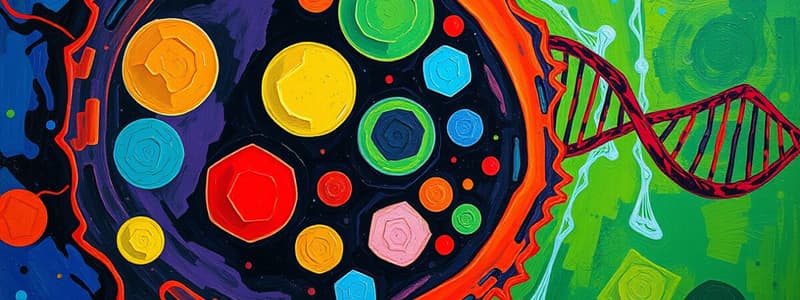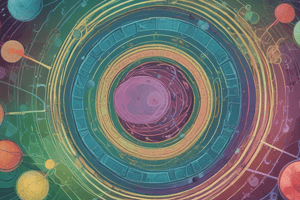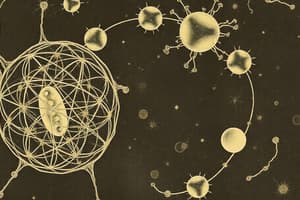Podcast
Questions and Answers
What role do regulatory proteins play in the cell cycle?
What role do regulatory proteins play in the cell cycle?
- They destroy damaged DNA.
- They synthesize new proteins for the cell.
- They prevent all cell divisions.
- They signal the cell to grow or delay division. (correct)
What is the function of the G1 checkpoint in the cell cycle?
What is the function of the G1 checkpoint in the cell cycle?
- To check the alignment of chromosomes.
- To determine whether the cell is ready to divide. (correct)
- To ensure that DNA is replicated correctly.
- To initiate the synthesis of new proteins.
What does the S checkpoint assess during the cell cycle?
What does the S checkpoint assess during the cell cycle?
- The proper replication of DNA. (correct)
- The overall health of the cell.
- The nutritional status of the cell.
- The presence of regulatory proteins.
What can cause the deregulation of the cell cycle leading to cancer?
What can cause the deregulation of the cell cycle leading to cancer?
Which term is used to describe a mass of abnormal cells formed by rapidly dividing cancerous cells?
Which term is used to describe a mass of abnormal cells formed by rapidly dividing cancerous cells?
At which point does the mitotic spindle checkpoint occur?
At which point does the mitotic spindle checkpoint occur?
Why might cancerous cells lead to damage of tissues and organs?
Why might cancerous cells lead to damage of tissues and organs?
What happens if the cell cycle is not properly regulated?
What happens if the cell cycle is not properly regulated?
What is a potential consequence of damaged DNA in a cell?
What is a potential consequence of damaged DNA in a cell?
How do regulatory proteins primarily control the cell cycle?
How do regulatory proteins primarily control the cell cycle?
What is the primary purpose of the S phase in the cell cycle?
What is the primary purpose of the S phase in the cell cycle?
Which phase of the eukaryotic cell cycle is often referred to as the Growth Phase 1?
Which phase of the eukaryotic cell cycle is often referred to as the Growth Phase 1?
In the context of the eukaryotic cell cycle, what does the term interphase refer to?
In the context of the eukaryotic cell cycle, what does the term interphase refer to?
What are the main components of the mitotic phase (M) in the eukaryotic cell cycle?
What are the main components of the mitotic phase (M) in the eukaryotic cell cycle?
During which phase does the cell make final preparations to divide?
During which phase does the cell make final preparations to divide?
Which of the following statements about the cell cycle of prokaryotes is true?
Which of the following statements about the cell cycle of prokaryotes is true?
Which phase in the eukaryotic cell cycle is characterized by routine metabolic processes?
Which phase in the eukaryotic cell cycle is characterized by routine metabolic processes?
What is often the longest phase of the eukaryotic cell cycle?
What is often the longest phase of the eukaryotic cell cycle?
What happens during cytokinesis?
What happens during cytokinesis?
Regulatory proteins control the cell cycle by signaling the cell to start or delay moving to the next phase.
Regulatory proteins control the cell cycle by signaling the cell to start or delay moving to the next phase.
The S checkpoint is responsible for determining whether the cell should divide.
The S checkpoint is responsible for determining whether the cell should divide.
Cancerous cells typically divide much slower than normal cells.
Cancerous cells typically divide much slower than normal cells.
The mitotic spindle checkpoint occurs during metaphase when chromosomes align at the mitotic plate.
The mitotic spindle checkpoint occurs during metaphase when chromosomes align at the mitotic plate.
Cell checkpoints are designed to ensure that the cell is ready to proceed to the next phase of the cycle.
Cell checkpoints are designed to ensure that the cell is ready to proceed to the next phase of the cycle.
The cell cycle consists only of cell division and does not include growth or DNA synthesis.
The cell cycle consists only of cell division and does not include growth or DNA synthesis.
Interphase of the cell cycle can be divided into three phases: G1, S, and G2.
Interphase of the cell cycle can be divided into three phases: G1, S, and G2.
Cytokinesis occurs during the interphase of the eukaryotic cell cycle.
Cytokinesis occurs during the interphase of the eukaryotic cell cycle.
In eukaryotes, the cell cycle is simpler than that of prokaryotes.
In eukaryotes, the cell cycle is simpler than that of prokaryotes.
During the S phase, the cell's DNA is replicated.
During the S phase, the cell's DNA is replicated.
Flashcards are hidden until you start studying
Study Notes
Cell Life Cycle
- Cells, like organisms, undergo a life cycle consisting of phases leading to division, known as the cell cycle.
- This cycle incorporates growth, DNA synthesis, and eventual cell division.
Phases of the Eukaryotic Cell Cycle
- Eukaryotic cells primarily exist in interphase, broken down into G1, S, and G2 phases.
- Cell division occurs during the mitotic phase (M), which encompasses mitosis and cytokinesis, marking the split of the nucleus and cytoplasm.
Interphase Details
- Gap 1 (G1):
- The cell experiences rapid growth and conducts routine metabolic activities.
- Proteins crucial for DNA replication are synthesized, and organelles are duplicated in preparation for division.
- Synthesis Phase (S):
- DNA replication takes place, resulting in the duplication of the cell's genetic material.
- Gap 2 (G2):
- The cell completes final preparations for division, creating additional proteins and organelles.
Regulation of the Cell Cycle
- The cell cycle is tightly regulated through specific proteins that signal transition through phases.
- Key checkpoints prevent premature progression to the next stage, ensuring previous phases are completed satisfactorily.
Checkpoints in the Cell Cycle
- G1 Checkpoint:
- Occurs before S phase; assesses if the cell is ready to divide.
- S Checkpoint:
- Verifies if DNA replication has occurred correctly.
- Mitosis Checkpoint:
- Takes place during metaphase, ensuring all chromosomes are correctly aligned at the mitotic plate.
Cancer and the Cell Cycle
- Cancer arises from loss of regulation in the cell cycle, often due to DNA damage from radiation or chemicals.
- Cancerous cells proliferate at an accelerated rate, potentially forming tumors that consume resources and space needed by normal cells, causing damage to tissues and organs.
Cell Life Cycle
- Cells, like organisms, undergo a life cycle consisting of phases leading to division, known as the cell cycle.
- This cycle incorporates growth, DNA synthesis, and eventual cell division.
Phases of the Eukaryotic Cell Cycle
- Eukaryotic cells primarily exist in interphase, broken down into G1, S, and G2 phases.
- Cell division occurs during the mitotic phase (M), which encompasses mitosis and cytokinesis, marking the split of the nucleus and cytoplasm.
Interphase Details
- Gap 1 (G1):
- The cell experiences rapid growth and conducts routine metabolic activities.
- Proteins crucial for DNA replication are synthesized, and organelles are duplicated in preparation for division.
- Synthesis Phase (S):
- DNA replication takes place, resulting in the duplication of the cell's genetic material.
- Gap 2 (G2):
- The cell completes final preparations for division, creating additional proteins and organelles.
Regulation of the Cell Cycle
- The cell cycle is tightly regulated through specific proteins that signal transition through phases.
- Key checkpoints prevent premature progression to the next stage, ensuring previous phases are completed satisfactorily.
Checkpoints in the Cell Cycle
- G1 Checkpoint:
- Occurs before S phase; assesses if the cell is ready to divide.
- S Checkpoint:
- Verifies if DNA replication has occurred correctly.
- Mitosis Checkpoint:
- Takes place during metaphase, ensuring all chromosomes are correctly aligned at the mitotic plate.
Cancer and the Cell Cycle
- Cancer arises from loss of regulation in the cell cycle, often due to DNA damage from radiation or chemicals.
- Cancerous cells proliferate at an accelerated rate, potentially forming tumors that consume resources and space needed by normal cells, causing damage to tissues and organs.
Studying That Suits You
Use AI to generate personalized quizzes and flashcards to suit your learning preferences.




